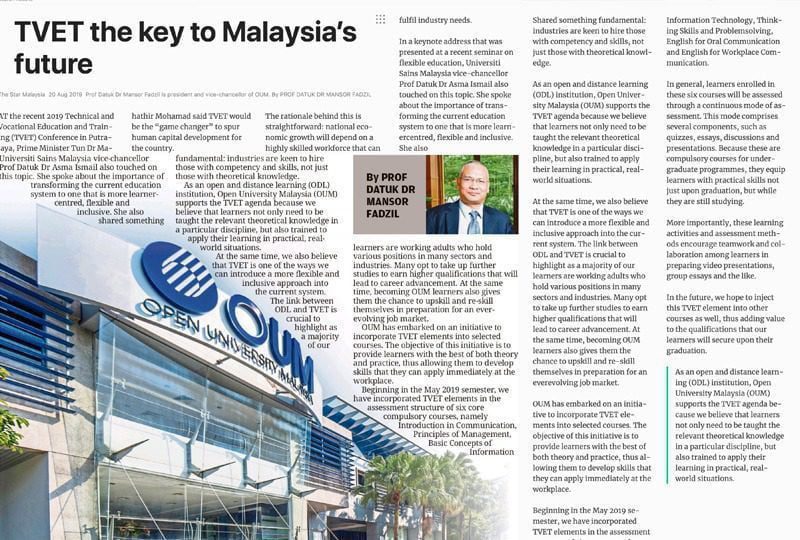At the recent 2019 Technical and Vocational Education and Training (TVET) Conference in Putrajaya, Prime Minister Tun Dr Mahathir Mohamad said TVET would be the “game changer” to spur human capital development for the country.
The rationale behind this is straightforward: economic growth will depend on a highly skilled workforce that can fulfil industry needs.
In a keynote address that was presented at a recent seminar on flexible education, Universiti Sains Malaysia Vice-Chancellor Prof Datuk Dr Asma Ismail also touched on this topic. She spoke about the importance of transforming the current education system to one that is more learner-centred, flexible and inclusive. She also shared something fundamental: industries are keen to hire those with competency and skills, not just those with theoretical knowledge.
As an open and distance learning (ODL) institution, Open University Malaysia (OUM) supports the TVET agenda because we believe that learners not only need to be taught the relevant theoretical knowledge in a particular discipline, but also trained to apply their learning in practical, real-world situations.
At the same time, we also believe that TVET is one of the ways we can introduce a more flexible and inclusive approach into the current system.
The link between ODL and TVET is crucial to highlight as a majority of our learners are working adults who hold various positions in many sectors and industries. Many opt to take up further studies to earn higher qualifications that will lead to career advancement. At the same time, becoming OUM learners also gives them the chance to upskill and re-skill themselves in preparation of an ever-evolving job market.
OUM has embarked on an initiative to incorporate TVET elements into selected courses. The objective of this initiative is to provide learners with the best of both theory and practice, thus allowing them to develop skills that they can apply immediately at the workplace.
Beginning in the May 2019 semester, we have incorporated TVET elements in the assessment structure of six core compulsory courses, namely Introduction in Communication, Principles of Management, Basic Concepts of Information Technology, Thinking Skills and Problem-Solving, English for Oral Communication, and English for Workplace Communication.
In general, learners enrolled in these six courses will be assessed through the continuous mode of assessment. This mode comprises several components, such as quizzes, essays, discussions and presentations. Because these are compulsory courses for undergraduate programmes they equip learners with practical skills not just upon graduation, but while they are still studying.
More importantly, these learning activities and assessment methods encourage teamwork and collaboration among learners in preparing video presentations, group essays and the like.
In the future, we hope to inject this TVET element into other courses as well, thus adding value to the qualifications that our learners will secure upon their graduation.
Prof Dato’ Dr Mansor Fadzil
President/Vice-Chancellor
Open University Malaysia

